

Knowledge Management in Healthcare. Abstract Healthcare organizations are facing many challenges in the 21st Century due to changes taking place in global healthcare systems.
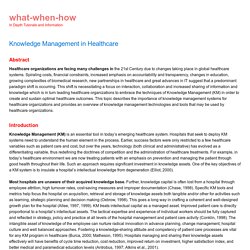
Spiraling costs, financial constraints, increased emphasis on accountability and transparency, changes in education, growing complexities of biomedical research, new partnerships in healthcare and great advances in IT suggest that a predominant paradigm shift is occurring. Healthcare Knowledge Management. Introduction The healthcare environment is changing rapidly, and effective management of the knowledge base in this area is an integral part of delivering high-quality patient care.
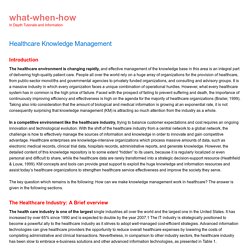
People all over the world rely on a huge array of organizations for the provision of healthcare, from public-sector monoliths and governmental agencies to privately funded organizations, and consulting and advisory groups. It is a massive industry in which every organization faces a unique combination of operational hurdles. However, what every healthcare system has in common is the high price of failure. Faced with the prospect of failing to prevent suffering and death, the importance of continuously improving efficiency and effectiveness is high on the agenda for the majority of healthcare organizations (Brailer, 1999). In a competitive environment like the healthcare industry, trying to balance customer expectations and cost requires an ongoing innovation and technological evolution.
Table 1. Table 2. Which Stats Test - Next Question: SAGE Research Methods. How to use Which Stats Test Read the question and select an answer.
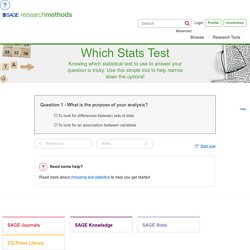
Click 'Next' when you are ready to move onto the next question. There is help text and links under each question if you are unsure. You can go back to the previous question by clicking 'Back', or jump back to the beginning by clicking 'Start Over'. When you have answered the questions, we will suggest a suitable method and provide links to more information on SAGE Research Methods. What is Which Stats Test? Which Stats Test will help you choose the right statistical test for your data analysis, guiding you through questions on the number and type of variables you have and the type of comparison you are planning. Reference & User Services Association (RUSA) Skills Policies Technologies Staffing/Partners Marketing Skills "Share positive patron feedback with librarians "Know when to transfer the chat session to either email or the phone.
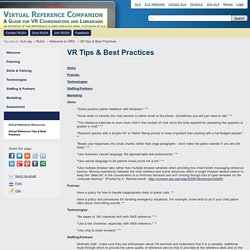
"The reference interview is even more vital in the context of chat since the time required for answering the question is greater in chat "Respond quickly with a simple 'Hi! ' "Break your responses into small chunks rather than large paragraphs - don't make the patron wonder if you are still there "Use 'business casual' language. "Use natural language to let patrons know you're not a bot "Use multiple browser tabs rather than multiple browser windows when providing live chat/instant messaging reference service. DataONE. Mesh generator. ?articles. A team of editors and researchers calls on journal publishers to use citation distributions as measures of publication quality rather than relying on much-derided impact factors.
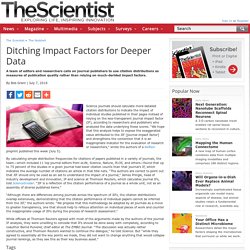
Science journals should calculate more-detailed citation distributions to indicate the impact of individual studies published in their pages instead of relying on the less-transparent journal impact factor (IF), according to researchers and publishers who analyzed the data underlying these scores. “We hope that this analysis helps to expose the exaggerated value attributed to the JIF [journal impact factor] and strengthens the contention that it is an inappropriate indicator for the evaluation of research or researchers,” wrote the authors of a bioRxiv preprint published this week (July 5). 2. Scopus - Citation Analysis Guide - Research Guides at University of Michigan Library. Access Scopus (sign in for off-campus use, if necessary) Using the drop-down menu on the basic search option, select "Source Title" then enter the title of the journal and click the search button.
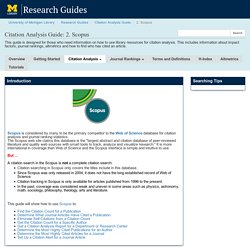
If necessary, refine your results in order to include only the journal you want. To do this select the box next to that title and click the "limit to" button. Organizational Knowledge Sharing Practices. This page originally authored by Ariane Montcalm (2013) Organizational knowledge sharing practices include all of the activities and processes, both formal and informal, by which knowledge is shared and created throughout an organization.
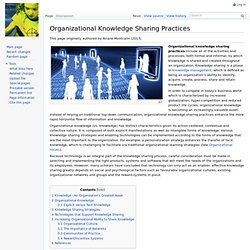
Knowledge sharing is a phase in knowledge management, which is defined as being an organization's ability to identify, acquire, create, process, share and retain knowledge. In order to compete in today’s business world which is characterized by increased globalization, hyper-competition and reduced product life cycles, organizational knowledge is becoming an increasingly valuable asset. Instead of relying on traditional top-down communication, organizational knowledge sharing practices enhance the more rapid horizontal flow of information and knowledge. Organizational knowledge (vs. knowledge) has distinct characteristics given its action-centered, contextual and collective nature. Knowledge - An Organization's Greatest Asset.